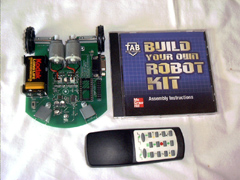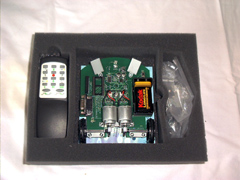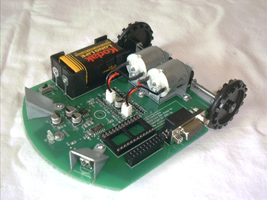TAB Electronics Build Your Own Robot Kit

Zac takes a look at the TAB Electronics Build Your Own Robot Kit
TAB Electronics Build Your Own Robot Kit
Designers: Myke Predko and Ben Wirz
Publisher: McGraw-Hill
Rating: 4/5
Notes: Excellent for beginners
 PROBABLY
a month ago I remember visiting my local Dick Smith Electronics and
noticing a new kit - the TAB Electronics Build Your Own Robot Kit.
After a quick browse of the box I realised that it was just a
pre-assembled PCB which required the mechanics to be mounted and deemed
it unworthy of any further attention. But after recently getting the
chance to assemble and review the kit that I found myself much more
surprised at its potential as a starting point for thoe just starting
into the area of hobby robotics...
PROBABLY
a month ago I remember visiting my local Dick Smith Electronics and
noticing a new kit - the TAB Electronics Build Your Own Robot Kit.
After a quick browse of the box I realised that it was just a
pre-assembled PCB which required the mechanics to be mounted and deemed
it unworthy of any further attention. But after recently getting the
chance to assemble and review the kit that I found myself much more
surprised at its potential as a starting point for thoe just starting
into the area of hobby robotics...
Upon opening the Build Your Own Robot Kit I was surprised at the beautiful foam holster which presented me with an IR remote control, blank robot PCB, a handul of mechanical components and the assembly instructions CD-ROM. 5 points for packaging ;). Once everything is unpacked and contents of the little sealed antistatic bags are nicely spread out across the table you can begin construction. Two handy hints - unpack the parts at your computer desk so that you don't have to run back and forwards to see how to build it and empty the sealed bags into a dish so that the parts don't try to run away!
Construction is pretty simple and takes under 15 minutes for an
experienced builder. One little nitpick I think could be a problem for
less experienced builders is that the fasteners (nuts and bolts) aren't
really identified in laymans terms. After plugging in a slightly flat 9
volt battery and getting some strange results, I discovered that the
robot prefers to run properly when there's plenty of power available
and works fine on a fresh battery.
Remote controls are cool! I think the whole remote control functionality really is the part that makes the kit worthwhile. It adds real commandability and allows the user to either manually drive the bot or trigger one of the four internal preprogrammed behaviours. One thing I did find was that the remote control function symbols were a little bit confusing when trying to make quick actions and could have been marked better on the keypad.
Whilst the onboard PIC12C505 microcontroller with its built in programs provides for a little amusement and a nice starting point for understanding behaviours, the robot cries out for user programming. Luckily if you're prepared to fork out some extra cash for a Basic Stamp 2 (or have one already), there is a 24 pin DIP socket and serial programming cable connector built in to accept a brains upgrade. As a bonus the kit does come with a nice little coupon for US$15 off the cost of a Basic Stamp 2.
As mentioned, there are four basic built-in behaviours: random movement
with collision avoidance, photovore (light seeking), photophobe (light
avoiding) and right-hand-rule maze solving. All of these work quite
effectively and I was especially impressed with the robots obstacle
detection abilities.
Input wise, the robot has two Light Dependant Resistors (or CDS cells) and two IR demodulator ICs all mounted in a pair of metal housings which only allow light to pass in from the front. The IR demodulators (and associated IR emitter) do a good job of obstacle detection. Light seeking and avoidance both work well using the inbuilt programs, indicating a good light sensor setup. The motors work very nicely and when the speed is set to maximum (using the increase/decrease speed buttons on the remote) the robot can move quite fast. And of course what would a robot be without a cool little LED to indicate stuff such as recieved remote control signals.
The documentation that comes with the kit is straight out excellent. I don't think I've ever read such an extensive instruction manual, ever! It details everything from how to assemble the robot, using the remote control, the basics of electronics, the robot's electronics, how to upgrade with a Basic Stamp 2 and a bunch of links to interesting robot related websites. It even includes a hefty chunk of the Robot Builder's Bonanza by Gordon McComb, something which I would have greatly appreciated if I didn't already own that book :). The only complaint about the documentation is that it is on a CD-ROM and I prefer to read stuff from paper, not a computer screen. Sure, you can always print it out yourself but it would cost a lot more than what it would cost the publisher. Here's another tip - the sleeve in the CD-ROM jewel case contains instructions which are a a bit less detailed than the ones on the CD, but printed instructions, nonetheless.
Hackability. In my opinion this is probably one of the most important
aspects of a robot kit. Luckily, with the addition of a BS2, this robot
can potentially become quite powerful! One of the things that I noticed
during assembly was that the gears on the wheel shafts had about 10
small holes in a circle. My mind immediatley shouted "optical encoders"
but I then discovered that there were no such provisions on the robot.
But it would be easily achievable with the addition of a two IR
emitter/detector pairs. There is a socket next to the BS2 socket which
connects to a bunch of the stamp's I/O pins and the power rails. A PCB
could easily be plugged into this to provide for much more custom
circuit designs, etc.
Overall, I was quite impressed with the TAB Electronics Build Your Own Robot Kit. It provides a very capable small scale beginners robot and experimenting platform which would be perfect for young teenage kids who want to get an insight into this exciting hobby. With a RRP of US$59.95, I would recommend it as a good value Christmas present for a younger relative who shows an interest in technology.
I give it 4 stars out of 5. Buy this book now.
TAB Electronics Build Your Own Robot Kit
Designers: Myke Predko and Ben Wirz
Publisher: McGraw-Hill
Rating: 4/5
Notes: Excellent for beginners
 PROBABLY
a month ago I remember visiting my local Dick Smith Electronics and
noticing a new kit - the TAB Electronics Build Your Own Robot Kit.
After a quick browse of the box I realised that it was just a
pre-assembled PCB which required the mechanics to be mounted and deemed
it unworthy of any further attention. But after recently getting the
chance to assemble and review the kit that I found myself much more
surprised at its potential as a starting point for thoe just starting
into the area of hobby robotics...
PROBABLY
a month ago I remember visiting my local Dick Smith Electronics and
noticing a new kit - the TAB Electronics Build Your Own Robot Kit.
After a quick browse of the box I realised that it was just a
pre-assembled PCB which required the mechanics to be mounted and deemed
it unworthy of any further attention. But after recently getting the
chance to assemble and review the kit that I found myself much more
surprised at its potential as a starting point for thoe just starting
into the area of hobby robotics...Upon opening the Build Your Own Robot Kit I was surprised at the beautiful foam holster which presented me with an IR remote control, blank robot PCB, a handul of mechanical components and the assembly instructions CD-ROM. 5 points for packaging ;). Once everything is unpacked and contents of the little sealed antistatic bags are nicely spread out across the table you can begin construction. Two handy hints - unpack the parts at your computer desk so that you don't have to run back and forwards to see how to build it and empty the sealed bags into a dish so that the parts don't try to run away!

|
| Contents of the kit, assembled |
Remote controls are cool! I think the whole remote control functionality really is the part that makes the kit worthwhile. It adds real commandability and allows the user to either manually drive the bot or trigger one of the four internal preprogrammed behaviours. One thing I did find was that the remote control function symbols were a little bit confusing when trying to make quick actions and could have been marked better on the keypad.
Whilst the onboard PIC12C505 microcontroller with its built in programs provides for a little amusement and a nice starting point for understanding behaviours, the robot cries out for user programming. Luckily if you're prepared to fork out some extra cash for a Basic Stamp 2 (or have one already), there is a 24 pin DIP socket and serial programming cable connector built in to accept a brains upgrade. As a bonus the kit does come with a nice little coupon for US$15 off the cost of a Basic Stamp 2.

|
| The cool foam packaging also makes for great, safe robot storage! |
Input wise, the robot has two Light Dependant Resistors (or CDS cells) and two IR demodulator ICs all mounted in a pair of metal housings which only allow light to pass in from the front. The IR demodulators (and associated IR emitter) do a good job of obstacle detection. Light seeking and avoidance both work well using the inbuilt programs, indicating a good light sensor setup. The motors work very nicely and when the speed is set to maximum (using the increase/decrease speed buttons on the remote) the robot can move quite fast. And of course what would a robot be without a cool little LED to indicate stuff such as recieved remote control signals.
The documentation that comes with the kit is straight out excellent. I don't think I've ever read such an extensive instruction manual, ever! It details everything from how to assemble the robot, using the remote control, the basics of electronics, the robot's electronics, how to upgrade with a Basic Stamp 2 and a bunch of links to interesting robot related websites. It even includes a hefty chunk of the Robot Builder's Bonanza by Gordon McComb, something which I would have greatly appreciated if I didn't already own that book :). The only complaint about the documentation is that it is on a CD-ROM and I prefer to read stuff from paper, not a computer screen. Sure, you can always print it out yourself but it would cost a lot more than what it would cost the publisher. Here's another tip - the sleeve in the CD-ROM jewel case contains instructions which are a a bit less detailed than the ones on the CD, but printed instructions, nonetheless.

|
| The nifty little that has no official name... |
Overall, I was quite impressed with the TAB Electronics Build Your Own Robot Kit. It provides a very capable small scale beginners robot and experimenting platform which would be perfect for young teenage kids who want to get an insight into this exciting hobby. With a RRP of US$59.95, I would recommend it as a good value Christmas present for a younger relative who shows an interest in technology.
I give it 4 stars out of 5. Buy this book now.
Thanks for helping to keep our community civil!
Notify staff privately
You flagged this as spam. Undo flag.Flag Post
It's Spam
This post is an advertisement, or vandalism. It is not useful or relevant to the current topic.
This post is an advertisement, or vandalism. It is not useful or relevant to the current topic.
You flagged this as spam. Undo flag.Flag Post


